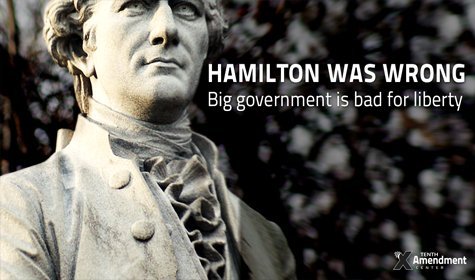EDITOR’S NOTE: The following is the first in a series of articles giving an introduction to the Federalist Papers, a collection of 85 articles and essays written by Alexander Hamilton, James Madison, and John Jay promoting the ratification of the United States Constitution.
Federalist #1 serves as an introduction, setting the stage for the series of papers that will follow. The paper provides an overview of the primary issues involved in the ratification debates, and seeks to establish a negative characterization of the opposition, clearly meant to diminish their objections in the eyes of the public.
Hamilton wastes no time trying to establish that ratification of the proposed Constitution is imperative. He employs hyperbole as a rhetorical tactic throughout the Federalist #1, and he jumps right in, asserting that not only does the very existence of the Union depend on establishing the Constitution, but also the future of good government throughout the world.
“It has been frequently remarked that it seems to have been reserved to the people of this country…to decide the important question, whether societies of men are really capable or not of establishing good government from reflection and choice, or whether they are forever destined to depend for their political constitutions on accident and force. If there be any truth in the remark, the crisis at which we are arrived may with propriety be regarded as the era in which that decision is to be made…And a wrong election of the part we shall act may, in this view, deserve to be considered as the general misfortune of mankind.”
Hamilton moves on to spend the bulk of his first paper trying to create a negative impression of those opposing ratification. The hyperbole continues to flow from his quill pin as he accurately defines the main objection to the proposed Constitution, while simultaneously characterizing opponents’ fears as unreasonable, or even self-serving.
A study of the ratification debates reveals there were objections to many specific constitutional provisions. But almost all of them revolve around one foundational issue: many Americans feared establishing a strong central government at the expense of the states, and worried that it would prove impossible to limit the new government to its delegated powers.
Hamilton recognizes the root of his opponents’ objections and seeks to diminish them in the minds of his readers. He calls into question the motivation of his opponents by characterizing concerns about over-expansive federal authority as a lust for personal power.
“Among the most formidable of the obstacles which the new Constitution will have to encounter may readily be distinguished the obvious interest of a certain class of men in every State to resist all changes which may hazard a diminution of the power, emolument, and consequence of the offices they hold under the State establishments.”
Hamilton reveals his preference for centralized government as he takes on the notion that the national government proposed by the Constitution could become too powerful and devolve into tyranny. He argues that anemic and inefficient governance, like that under the Articles of Confederation, poses a far greater threat to liberty.
“On the other hand, it will be equally forgotten that the vigor of government is essential to the security of liberty; that, in the contemplation of a sound and well-informed judgment, their interest can never be separated; and that a dangerous ambition more often lurks behind the specious mask of zeal for the rights of the people than under the forbidden appearance of zeal for the firmness and efficiency of government. History will teach us that the former has been found a much more certain road to the introduction of despotism than the latter, and that of those men who have overturned the liberties of republics, the greatest number have begun their career by paying an obsequious court to the people; commencing demagogues, and ending tyrants.”
Hamilton then contrasts the unreasonable nature of his opponents with his own fair-mindedness through a disclaimer, making it clear he supports the Constitution.
“Yes, my countrymen, I own to you that, after having given it an attentive consideration, I am clearly of opinion it is your interest to adopt it.”
But he implores his readers to consider his arguments based on their merits, writing that they “will be open to all, and may be judged of by all.”
After listing the prime arguments against the constitution he intends to address, Hamilton concludes by returning to the subject he opened with: the imperative need to ratify the Constitution, arguing that without it, the Union will cease to exist, and indeed some opponents hope for just that outcome.
“But the fact is, that we already hear it whispered in the private circles of those who oppose the new Constitution, that the thirteen States are of too great extent for any general system, and that we must of necessity resort to separate confederacies of distinct portions of the whole.”
This sets the stage for Federalist #2.


:quality(75)/https://static.texastribune.org/media/files/229dad88aac50fc6ddfd42d954a4aac7/US%20Capitol%20REUTERS%20TT%2013.jpg?w=440&resize=440,264&ssl=1)
:quality(75)/https://static.texastribune.org/media/files/ba19bb21acb4df17e7948107e47e34f1/0923%20Harris%20Co%20EG%2030.JPG?w=440&resize=440,264&ssl=1)
![Supreme Court’s Latest Ruling Paves the Way for Government-Controlled Censorship [VIDEO]](https://i1.wp.com/austincountynewsonline.com/wp-content/uploads/2014/06/supreme-court.jpg?w=440&resize=440,264&ssl=1)
